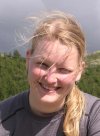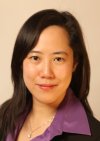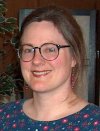The Java Community Process (JCP) program just celebrated our tenth year of establishing Java technology standards. Over the past decade, the vision has stayed constant while the focus has shifted as needed to become more inclusive and open. The current focus on transparency and agility naturally invites a review of the various corners of the community. Therefore, in joining the world's immediate celebration of International Women's Day, March 8, 2009, it makes sense to check in with the activities of our JCP program women.
1911 was the first year that International Women's Day was recognized. The goal of Clara Zetkin, the originator of the idea, was for countries to devote one day annually toward enabling women to lobby for their demands. Because of the relentless dedication of many women, and men, too, the doors of opportunity stand wide open in many parts of the world. In the JCP community, for example, gender simply is not a factor in deciding who will participate, lead, and serve. All men and women are welcome to cooperate in the process of standardizing Java technologies.
The JCP program has been steadily reducing other perceived barriers to entry. In 2005, it became easier (and free!) for individuals to participate in the JCP program, giving them equal standing with members who are corporations and institutions. Now, three-fourths of the 1465 members are individuals. In 2005, the majority of Java Specification Requests (JSRs) were led by Sun, but at present two-thirds of the Active JSRs are led by other community members, including some individuals. At the beginning of this year, several Java User Groups (JUGs), including Duchess, a JUG specifically for women, decided to bring their organization into the fold and take advantage of an offer to join the program with the membership fee waived.
Even so, there is still a significant discrepancy in the ratio of men to women in the JCP community, reflecting trends in high tech industries. A recent study indicates that just 30 percent of the computer and information sciences workforce worldwide are women . Although this kind of a disparity holds true within the JCP community as well, we found professional women at every possible level of involvement who are making the program run with transparency and agility -- in the Program Management Office (PMO), Executive Committee (EC),working on JSRs as Spec Leads and Experts, and in the JUGs that are becoming part of the JCP membership.
There may not be many women, but the ones who are involved are competent, inspiring, and in some cases award-winning. Check out their profiles:
- Executive Committee: Vicki Shipkowitz (SAP)
For over 15 years, Vicki Shipkowitz has worked with other industry leaders at companies including SAP, Sun Microsystems, and Adobe Systems to drive products and technology platforms that have...
- Star Spec Lead: Linda DeMichiel (Sun)
Linda DeMichiel has positioned herself to achieve major goals in a focused area. She holds a Ph.D. in Computer Science from Stanford University and has more than 15 years of experience in the areas of...
- Star Spec Lead: Jaana Majakangas (Nokia)
Jaana Majakangas is crazy about mathematics, and she has the masters degree to prove it. Her high school math teacher was instrumental in igniting her enthusiasm for that subject. Jaana was so eager...
- Spec Lead: Pia Niemela (Nokia)
Because of her mother's strong encouragement and example, Pia Niemela is a senior design engineer at Nokia today. She says, "It was my mother who all through my school years emphasized that girls...
- Java User Group: Linda van der Pal (Duchess)
Linda van der Pal has a unique and new role within the JCP community. As leader of a Java User Group (JUG) dedicated to women, she has been instrumental in bringing well over a hundred female Java...
- Java User Group: Clara Ko (Duchess)
Clara Ko is a co-founder of Duchess Java User Group (JUG), which caters to female Java developers. Duchess is a new member of the JCP program. After graduating in 1996 from Berkeley...
- Program Office: Heather Vancura-Chilson (JCP PMO)
On-the-move is Heather Vancura-Chilson's preferred mode in her professional as well as personal life. Before arriving at the JCP community in 2000, she had worked her marketing and advertising magic...
- Program Office: Nancy Williams (JCP PMO)
In August 2000, Nancy Williams, armed with an associate's degree in Communications, was hired to be an admin for the PMO. Since then, she has been promoted to JCP program coordinator, and she...
- Writer: Susan Mitchell (Independent Technical Writer)
Susan Mitchell had a lot of fun reading the literature that earned her bachelors and masters degrees in English. When she moved to the Silicon Valley in 1990, she decided to take advantage of the...
 |
|
| Vicki Shipkowitz |
 |
For over 15 years, Vicki Shipkowitz has worked with other industry leaders at companies including SAP, Sun Microsystems, and Adobe Systems to drive products and technology platforms that have become ubiquitous within enterprise, media and mobile computing. As a product manager in Sun's JavaSoft group in 1996, she led early API development activities with industry partners even before the JCP program had formalized. With an inside view of "the exciting and challenging formation of the JCP," Vicki was the product manager for the program's first API, JSR 001, Real-Time Specification for Java.
In her current role, as director of strategy and operations within SAP's Standards Management and Strategy organization, Vicki has participated in the governance of organizations defining standards to enable Service Oriented Architectures. When she joined SAP, she also moved into a new role with the JCP program, participating as an alternate representative in the Java SE/EE Executive Committee since 2003. "Being involved with governance of the JCP from the 'outside' as a partner gave me an appreciation of the issues faced by companies who were both investing in Java technology and helping to make the Java community successful."
Over the years, Vicki has been able to observe many changes in the JCP program. She believes these changes have been inspired by maturity of the market, the community, and Java technology. Most importantly, she recognizes that the industry model for developing community-based technologies has dramatically changed, and this has resulted in the JCP program's adoption of a greater level of transparency where community involvement has more effectively informed essential technology and leadership decisions. "This evolution isn't over, and personally I would hope to see even more movement in this direction in the future. It is critical to the long term success of the JCP," she says.
Vicki is concerned about the minority stake women hold in the high tech industry, and she wishes she could do more to prepare the way for women. Throughout her career she has helped women she has hired build important business skills, has exposed their skills to others to promote their success, and has offered guidance when asked. Likewise, in her extensive non-profit board work, including her current role driving the Technology Advisory Committee of the ArtSpan Board of Trustees, she has invested a great deal of time working with female staff to assist them however possible in evolving both their technical and business skills. In general, she advises women, "Don't be afraid to ask for advice, turn up the volume on your voice, and always be prepared."
Vicki has some ideas about how the JCP community can encourage women to get involved, but it requires that the organization actively seek out women who can and want to participate in JSRs and in governance activities. Vicki knows from personal experience that serious community participation requires a significant time investment. "As such, I would encourage community member companies to make time available for their female Java Experts to become involved. I would also encourage current JSR leads to help their female colleagues learn the ropes and provide them with the exposure opportunities necessary to gain community support and take on leadership roles in the future," she says.
 |
|
| Linda DeMichiel |
 |
Linda DeMichiel has positioned herself to achieve major goals in a focused area. She holds a Ph.D. in Computer Science from Stanford University and has more than 15 years of experience in the areas of databases, object persistence, distributed computing, and object-oriented languages. She is a senior architect in the Java Enterprise Edition (EE) Platform group at Sun Microsystems and Sun's chief architect for Enterprise JavaBeans (EJB) and the Java Persistence API.
Linda's experience with the JCP program dates back to 1999, around the time that J2EE director Mala Chandra, a woman, recruited Linda to drive EJB. Linda took over as Spec Lead of EJB with JSR 19, then JSR 153 for the second version, and JSR 220 for the third version. She is currently the Spec Lead for JSR 317, Java Persistence 2.0. She has also represented Sun Microsystems as an Expert Group member on several other JSRs, including:
- JSR 26, UML/EJB Mapping Specification
- JSR 107, JCACHE - Java Temporary Caching API
- JSR 207, Process Definition for Java
- JSR 225 XQuery API for JavaTM (XQJ)
In 2005, Linda achieved recognition as a Star Spec Lead, and the following year she earned the JCP program award for Outstanding Java SE/EE Spec Lead of the Year. Linda has been interviewed by artima developer and other online and print publications. She is in demand as a speaker at the TheServerSide.com Java Symposium, JavaPolis, O'Reilly Conference on Enterprise Java, and other venues. Her technical session was listed as the top destination for enterprise developers at the 2006 JavaOne conference.
Linda has gotten used to being the only woman in her Expert Groups, but she can't help noticing the absence of other women and the need for the industry to encourage senior technical women to become leaders in the Java community.
She says, "It's not that universities aren't graduating sufficient technical women--including with masters degrees and even PhDs. However, I have noticed a definite thinning of the ranks in terms of women in positions of senior technical leadership, as opposed to senior management positions such as women directors and VPs. I think we need to put more work into understanding the reasons why that is, and address them. The longer I have served in my current role, the more noticeable this has become to me. It is a waste; there should be more of us."
 |
|
| Jaana Majakangas |
 |
Jaana Majakangas is crazy about mathematics, and she has the masters degree to prove it. Her high school math teacher was instrumental in igniting her enthusiasm for that subject. Jaana was so eager to get involved that her career in the IT industry began with Nokia even before she had graduated from the university.
Jaana is currently working as a standardization manager in the Devices unit of Nokia Corporation. She enjoys the challenge of learning new technical areas and the opportunity to apply her knowledge to the technical side of the project. The multi-faceted nature of her current position, which combines project management and technical work, held a deep attraction for her.
In the JCP program, Jaana has excelled in a variety of roles. She was formally recognized as a Star Spec Lead for her stellar work with JSR 257, Contactless Communication API, and JSR 293, Location API 2.0. The JCP community also endorsed her leadership of JSR 257 by nominating her Outstanding Java ME Spec Lead in 2005 and again in 2006. In 2008, her leadership of JSR 293 earned her the coveted Most Outstanding Spec Lead for Java ME award.
Jaana completed each specification within two years, which required moving at a fairly rapid, steady pace. "The progress of the project depended greatly on my efforts and my ability to get people from several companies working together," she says. At the time, the JCP program did not expect much transparency from Spec Leads. However, Jaana was ahead of her time in realizing its importance in fostering "more visibility for the JSRs in order to get valuable feedback from the community. We did some advertisement in JSR 293 ourselves to achieve that."
Jaana is now the Maintenance Lead for both specifications. Moreover, she currently serves as an Expert for JSR 271, Mobile Information Device Profile 3, and JSR 307, Network Mobility and Mobile Data API. Previously, she also contributed as an Expert Group member to the development of JSR 218, Connected Device Configuration (CDC) 1.1, and JSR, 219 Foundation Profile 1.1.
Women are a minority in the industry, and Jaana felt early on that she had to work a little harder to get her own ideas through or on rare occasions to keep control in meetings. She found that those small issues evened out pretty quickly, however. "My gender might have been a surprise to some of my Expert Group members in the beginning, but they have gotten used to it already," she says. Jaana feels quite secure in her role now: "I have earned my place. In fact, having worked in an almost completely female work-environment, I prefer this current situation when I'm in the minority," she says.
For those who aspire to technical accomplishment, Jaana urges them to "go after it; the work can be very rewarding. There are many ways of leading and participating in a JSR project, and there is not just one right way of doing things. So there is no need to feel that you can't do this job." As long as a woman Spec Lead earns the respect of her colleagues, Jaana believes gender is insignificant.
She passes on the message to others that her math teacher once instilled in her: "You should believe in yourself. You can do as good a job as any man."
 |
|
| Pia Niemela |
 |
Because of her mother's strong encouragement and example, Pia Niemela is a senior design engineer at Nokia today. She says, "It was my mother who all through my school years emphasized that girls should be good at math." Pia believes that parents and schools, rather than technical communities, are key to turning around the minority role women play in high tech industries. Moreover, she confesses to "being so old-fashioned that I see benefits in separating girls and boys in certain subjects, including math, physics, and computer science."
Pia's own pragmatic personality also contributed to her technical career choice because, as she puts it, "When doing something concrete you can, at least to a certain point, show that you are doing something 'useful.'" Pia's work with Nokia and with Expert Groups in the JCP program enables her to produce such tangible artifacts.
When Pia Niemela was a young girl, she probably received a "plays well with others" commendation on her report card. This trait has served her well in the JCP program, a place where men outnumber women, especially at the highest ranks. Pia earned her way to the next level by contributing as an Expert on:
Pia must have done a superb job in her Expert role because after a time she was invited to take on the role of Spec Lead for JSRs 256, 279, and 280. For the latter two JSRs, Pia has also worked smoothly with three co-Spec Leads who work for the competing corporation of Sun Microsystems: Jens Paetzold, Ellen Siegel, and Jean-Ytves Bitterlich. This kind of cooperation is not always easy, but Pia, we know, plays well with others.
Such cooperation is not something Pia needs to accomplish her ends, however. She became the sole Spec Lead for JSR 256 and graduated to Maintenance Lead, where she carried the specification through two more revisions. Now she is coordinates the team effort to implement the technology in Nokia's N97 "most advanced mobile computer" phone and make it downloadable to earlier phone models as well.
Pia appreciates the new emphasis of the JCP program, saying "Focusing on transparency is definitely a good target." However, she believes the benefits of operating her Expert Groups in a transparent fashion remain to be seen.
To fellow up-and-coming technical women, Pia has this advice to offer: "Do your homework, devote yourself to relaxed atmosphere, and don't be too concerned with trifles." At the same time, she notes the importance of "competence transfer," having benefited from the feedback of other technical women, including her officemate, Jaana Majakangas, and Natalia Mulligan, the previous Spec Lead for JSR 256. She has also appreciated good input from men, too, such as she received from her colleagues Panu Akerman, Erkki Rysa, and Kimmo Loytana.
 |
|
| Linda van der Pal |
 |
Linda van der Pal has a unique and new role within the JCP community. As leader of a Java User Group (JUG) dedicated to women, she has been instrumental in bringing well over a hundred female Java developers under the JCP program umbrella.
Linda loved computers from a very young age. For a while, though, it was unclear whether she would ever make a career with them. In a college-level C programming class, she readily grasped the theory of the language but was unable to make pointers submit to her bidding. She left the university thinking she'd never be a programmer. The Java language does not use pointers, and discovering that became Linda's salvation. Lunaris Informatica hired her, promising on-the-job training in Java programming. Since then, she has found success helping build projects such as an invoicing system for an electricity company, a call center application for a bank, and a voice-XML system for the same bank.
Now a professional, Linda attended Java conferences, where she noticed that relatively few Java programmers were women. Though shy, Linda came up with a handy excuse to get to know them: she would start an organization to "gather" them all. At a Masters of Java programming competition in late 2007, she launched her idea on three other women, and "they all loved it." The seed was planted and quickly grew. Other women were invited to participate, and soon afterward, at a bar in Amsterdam, five of them tossed ideas back and forth.
"It was quickly decided that we wanted more than just the social aspect I had been aiming at. We also wanted to share our knowledge and try to get more women into Java programming," says Linda. They approached the plan as a startup, soon designing the Duchess logo, open-sourcing it, launching the Dutch Duchess Foundation to give their group some legal standing, opening a bank account, and printing and distributing t-shirts and other promotional items. (Keep an eye on the Duchess website for new promotional items.)
Although their early efforts involved planning to visit Java events together, they soon began organizing technical events and workshops on Java and related technologies. "Of the many women I have talked to, less than a handful told me they weren't interested. Word spread so fast that not three weeks after our first meeting we were already international with a large contingent of Brazilian programmers, most of whom unfortunately never transitioned to our new site," says Linda.
As intended, the Duchess community attracts female Java programmers ranging from students to seasoned architects and academicians. Currently there are 132 members from 30 countries, with 40 members living in the Netherlands. Most Dutch members are Java developers or architects. Linda says, "They all are very capable of finding their way in the Java world but simply like the idea of locating other women with the same interests."
During the current time-limited promotion in which JUGs can join the JCP program for free, the Duchess community applied for membership and was accepted. Here's to more women coming soon to an Expert Group near you.
 |
|
| Clara Ko |
 |
Clara Ko is a co-founder of Duchess Java User Group (JUG), which caters to female Java developers. Duchess is a new member of the JCP program.
After graduating in 1996 from University of California Berkeley, Clara worked for Philips Semiconductors as a C/C++ programmer of software embedded on a multi-media chip used in set-top boxes and video conferencing systems. She focused on the software architecture, which aimed to provide a plug-and-play framework for audio and video driver software working with the chip. After moving to Paris where she consulted on software development on the same chip, she was persuaded to join a start-up in Amsterdam. "After a Java course for C developers, I was good to go. Java, being an object-oriented language, is much more suitable for making abstract and clean design before going into the details. This fits the way that I think much better than functional languages," she says.
Since then, Clara has held many jobs in various sectors such as banking, energy, and content management. At each one, she learns more and then shares her knowledge. Currently, a technical architect with ABN AMRO bank, Clara does her work using the philosophy of an "agile architect -- focusing on the overall picture, delivering quality code, and interfacing with business to translate business requirements into technical design."
Even off duty, Clara hones her skills. One pet project is a personal financial software package that includes features not found in American products such as Quicken. "I'm creating this to keep on top of my programming skills and to keep track of the latest Java technologies," she says. She spends the rest of her free time with the European Professional Women's Network and Duchess. When Clara discovered how few women hold computer science occupations in The Netherlands, she felt compelled to "spread the word that programming is a suitable, challenging, and fulfilling career for women."
According to Clara, the original purpose of Duchess was to make women already in the Java community visible, "so we'd know we are not alone. I wish I'd had this group support at the beginning of my career," she says. Women are the target members of Duchess, but the community decided to allow one male guest per member, realizing that this would help increase attendance at "the events we had worked so hard to organize." Moreover, changing the status quo of women in technology requires exposure to men as well.
Clara expects Duchess will give both career newbies and senior members the opportunity to share their knowledge and sharpen their leadership skills. One of Clara's big dreams is to see the Duchess community known and appreciated world-wide by Java developers and by companies who could recruit women. In an effort to establish a global mentoring program for women who work in Java technology, Clara is working with Heather Vancura-Chilson of the JCP PMO to identify female JCP members, especially Spec Leads, who would be willing to serve as mentors for their sisters in technology.
 |
|
| Heather VanCura |
 |
On-the-move is Heather Vancura-Chilson's preferred mode in her professional as well as personal life. Before arriving at the JCP community in 2000, she had worked her marketing and advertising magic for various high tech companies, including Microsoft, Cisco, Apple, and the Santa Cruz Operation. She joined the PMO staff as a marketing manager for the JCP program with experience and a bachelors in Business Administration under her belt. She established the JCP brand identity and logo programs, developed jcp.org, and conducted online surveys and usability studies. She also developed marketing programs, advertising campaigns, sponsorships, and events for the JCP program, including the community gathering at the annual JavaOne Conference.
Since 2005 Heather has moved into a broader role within the JCP program office. Now the PMO group manager, she is responsible for the day-to-day nurturing, support, and leadership of the community. She oversees the jcp.org web site, JSR management and posting, community relations, marketing, communications, and growth of membership through new members and renewals.
Heather has a front row seat for studying trends within the community and recommending changes . Several changes to the program in 2005 have played out in significant ways. For example, since individuals were invited to participate in the JCP program without charge, membership has grown to 1465, 75 percent of whom are individuals. One trend Heather wants to affect is the numbers of women in the JCP community. By hosting informal gatherings for women, involving groups like Duchess, and encouraging mentorships, she hopes to strengthen the numbers of women already seen at every level of the JCP program.
"As the JCP program has evolved to meet the needs of the community, it has become clear that there is an expectation for more transparency and agility," says Heather. Over the past year, she examined how the community currently works and implemented improvements to foster and encourage a working style that is more open, flexible, and visible to all. One tangible result is that the Executive Committee meeting materials and summaries are now available to the public.
Heather remains passionate about the power and potential of the JCP community and the pervasiveness of Java technology as it gains adoption in a widening array of devices and applications. "I am awed by the ability of this vibrant, diverse international community to work together toward a common goal," she says. You can follow Heather's blog, where she once described her job to her daughter as "helping folks play nice together on the playground."
Heather enjoys speaking at Javapolis (now Devoxx), Java Zone, The ServerSide Symposium, and the JavaOne Conference to such an extent that, for her free time, she is considering additions to her public speaking repertoire topics that reflect her other interests -- children, family, faith, health, exercise. Heather resides east of the San Francisco Bay, California, where the weather is gorgeous. A fan of exercise and the great outdoors, she gardens, runs, and leads her two daughters and a son on walks, hikes and treasure hunts. She has recently taken up Russian kettlebell training, volunteers for Junior Achievement and is enthusiastic about reading the Bible in One Year
 |
|
| Nancy Williams |
 |
In August 2000, Nancy Williams, armed with an associate's degree in Communications, was hired to be an admin for the PMO. Since then, she has been promoted to JCP program coordinator, and she fulfills several duties in that capacity.
Individuals, Java User Groups (JUGs), corporations, and other organizations who wish to secure membership in the JCP community all get to know Nancy Williams because she is the official gatekeeper. The key she holds is the JSPA agreement, which must be signed by each member in the JCP program. After all the paperwork is complete, Nancy forwards a welcome note including log-in credentials to the new member, sends an "incoming updates status" note to the community, and enters the newcomers into the JCP contact database.
All Expert Group nominations also go through Nancy. She lets each nominee know that the program office has received a request to participate in the development of a JSR, and she asks the nominee to submit a Java Specification Participation Agreement (JSPA) if they are not yet members of the JCP community. After Nancy processes this legal documentation, she sends a formal announcement containing the nominee's contact information and current JSPA to the Spec Lead of that Expert Group for consideration.
Nancy handles another kind of paperwork as well. She processes all Sun Contributor Agreements (SCAs), a document crafted by Sun Legal for assigning copyrights of contributions made to Sun sponsored communities. This single agreement permits the signatory to contribute to all products and projects owned or managed by Sun.
Nancy has enjoyed being involved in the JavaOne conferences in San Francisco and helping with various PMO festivities including the JCP program's ten-year birthday celebration held at the Computer History Museum in Mountain View, California. Her participation in events like these have given Nancy the opportunity to learn about the new technologies that the Java community offers. She is especially intrigued with the stages in the process that a JSR goes through, saying, "I find them fascinating simply because the process is carefully executed and developed to guarantee success within the JCP program. The simplest procedures are oh so powerful amongst the community. It's interesting to have such a wide variety of ideas put together to create and change the direction of the future."
Nancy is a native Californian who loves to sing, walk, hike, roller skate, and read romance novels. Her personal interest in life is to improve the environment to become a better place for our children to live and breathe and thrive.
 |
|
| Susan Mitchell |
 |
Susan Mitchell had a lot of fun reading the literature that earned her bachelors and masters degrees in English. When she moved to the Silicon Valley in 1990, she decided to shelve her interest in analyzing the classics and take advantage of the abundant technical writing opportunities.
"The neighbor of a friend of my friend brought me to her boss's attention, and he offered to hire me for twice the rate I requested. Fortunately he had a lot of integrity because I was extraordinarily naive," she says. To help her make the radical transition from ignorant to savvy, she became an active participant in the Society for Technical Communication.
Susan launched her career by documenting the wafer-processing equipment produced by Silicon Valley Group. After two years, she became part of The Carl Group, a technical writing agency that led her to excellent opportunities at Network Computing Devices, Lighthouse Design (now part of Sun Microsystems), and numerous departments within Sun Microsystems. "Tim Carl was wonderful mentor for me and many other technical writers. Eventually, we parted ways when I paused working to focus on raising my young son and daughter," she says.
People connections are essential for making it in this world. Susan says, "By making friends everywhere I worked, I ended up with a network of people looking out for me. I'd get emails from them telling me about an opportunity. In 2001 I gave in to the allure of Java technology and the JCP community, and I've been a writer for the PMO ever since."
Much of the content available at jcp.org bears Susan's fingerprints. She has written feature articles, case studies, success stories, Spec Lead tutorials, awards announcements, election reports, community focus profiles, Star Spec Lead profiles, and Executive Committee bios. She is also behind some of the marketing collateral that is distributed to the press, for example.
Susan finds it thrilling to interview architects on the cutting edge of technology, and the notion of standardization pleases her order-loving mind. At a recent JavaOne conference, she had the odd experience of sitting at a lunch table with a group of strangers who were all recognized professionals in their own techie worlds. While participating in their discussion, she began answering questions about Java technology, explaining the industry jargon, correcting misinformation, and pointing them to the JCP program. She realized, "Wow, I speak fluent Java!"
As the JCP community has matured into a more transparent, agile stance, Susan has enjoyed watching closed processes become open, JSRs develop far more quickly, APIs get implemented in everyday gadgets, partnerships work for the greater good, and so on. "It's a great time and place to be a technical writer, and I'm delighted to be a part of this community," she says.
|